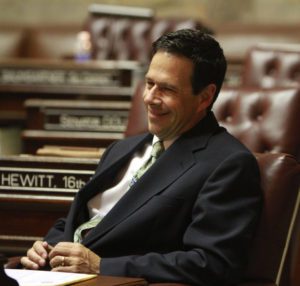Education Funding Takeaways from California
By Daniel Zavala, Director of Policy and Government Relations
 Two weeks ago, I went with a Washington delegation to Sacramento, the birthplace of the Local Control Funding Formula (LCFF), California’s shift from state-controlled funding to local decision-making. Joined by fellow education advocates and stakeholders, including members of our state legislature, we met with members from California’s education community. This included staffers with government agencies, association members (e.g. California Teachers Association), and public advocates.
Two weeks ago, I went with a Washington delegation to Sacramento, the birthplace of the Local Control Funding Formula (LCFF), California’s shift from state-controlled funding to local decision-making. Joined by fellow education advocates and stakeholders, including members of our state legislature, we met with members from California’s education community. This included staffers with government agencies, association members (e.g. California Teachers Association), and public advocates.
Our field trip was an exploration of the options available to our state in pursuing changes to our education funding system. California is just a few years into their model, and we got some great first-hand accounts of lessons learned and how they set up their system. However, the state is still grappling with exactly how they want to measure success, and districts are modifying their behavior based on their newfound spending freedom.
So what is the LCFF? The LCFF is a funding formula in California intended to provide resources more equitably to students with learning and socio-economic barriers, while providing greater flexibility to district leaders and school educators to serve and respond to their students’ needs.
California’s response to funding education fits squarely into three realms: the wild west of the 1960s and before, the Serrano* era of the 1970s where the state supreme court required equal funding of districts and wound up with over 40 restricted categorical funding areas leaving little flexibility in spending decisions, and the LCFF age that focuses on equitable funding based on student need. The shift from Serrano to the LCFF came after the Getting Down to Facts report highlighted issues and provided recommendations for a weighted funding model and shift to local control.
The LCFF operates under three funding streams: 1) a base grant that only varies based on the grade level band but is equal for all students across the state; 2) a supplemental grant of 20% more funding above the base grant for low-income, English-learners, and foster youth; and 3) a concentration grant of 50% more funding above the base grant for each student above a concentration threshold of 55% of students with high-needs (e.g. if a district has 60% economically disadvantaged students, then the 5% above that 55% threshold would generate the concentration grant increase). One important note is that special education funding is calculated and administered separately from the LCFF. Even without touching special education funding, this structure change resulted in a roughly $11B shift of resources toward students identified as high-need.
So now that districts have additional funds for students identified as high-need, what is the state doing to ensure fidelity of taxpayer money? In conjunction with the LCFF, districts compile a three-year Local Control and Accountability Plan (LCAP) with annual updates that outlines how the allocation of funds will address state defined priority areas including: 1) basic services, 2) implementation of state standards, 3) parent involvement, 4) student achievement, 5) student engagement, 6) school climate, 7) course access, and 8) other student outcomes. These plans are then evaluated based on a rubric with indicators focused on: 1) academics, 2) college and career readiness, 3) graduation rates, 4) English-learners, 5) chronic absenteeism, and 6) suspension rates. Where districts are not implementing plans with success, a regional California Collaborative for Educational Excellence (CCEE) provides technical assistance and support. Where districts fail to improve** or implement recommendations from the CCEE, schools are referred to the State Superintendent of Instruction (SPI) for intervention.
Takeaways/Lessons Learned
I know that is a lot to take in, and even this overview doesn’t get into the granular details of the program. With some background knowledge about LCFF and its origin, it is also important to note the takeaways and guidance given to our Washington delegation. First, the state must track how dollars are being spent, and specifically, where dollars are being spent with academic success. When we are talking about fulfilling our Washington state constitutional requirement for ample funding of basic education, we have a right to know where those public funds are being spent. Second, LCFF was a huge culture shift for schools and districts in how they worked with budgets and funding. That shift has to be accompanied by capacity building so that districts can build expertise on how to use data to identify needs to drive spending decisions. After all, the additional money is only helpful when the spending decisions are informed and targeted. Third, to help build capacity, some of the additional funding needs to be spent on training. If our state wants to do this well, we need to make sure we actually focus on quality implementation and give our school leaders the skills to effectively shift their spending practices. Which leads me to the final takeaway: implementation has to be phased in, so that schools and districts have time and incentives to learn how to operate under a new structure without fear of reproach during that transition.
So what does this mean for Washington? I think the California example presents a good framework for us to learn and discuss what would work in Washington. The LCFF is what a diverse group of Californians decided their schools needed. Now we have to embark on a discussion with ALL education stakeholders to learn how we can create a system that works first and foremost for the benefit of our students. One thing is certain, the current system is serving only some of our students and schools well, but it is not serving ALL our students equitably.
Our trip to Sacramento sparked three thoughts that I will leave with you:
Should we focus our efforts on continued district-level budgeting control or school-based budgeting? For instance, there are roughly 600 schools in California with majority high-need student populations within districts that do not reach the concentration grant threshold.
How does an equitable funding system take into account regional cost differences, whether that is cost of living or hard-to-staff subjects and schools requiring additional funding for compensation?
Finally, how do we ensure that there is community-level engagement, understanding, and transparency in our funding system?
*Serrano v. Priest lawsuits and Proposition 13 (1971-1978)
**defined as districts that “fail to improve outcomes of 3 or more student subgroups in 1 or more priorities in 3 out of 4 school years.”
Watch our LEVinar on Education Funding Takeaways from California
 There isn’t a law that forbids any one of us from understanding how capable we are or how capable we are allowed to be. A few posts back, I mentioned my friend
There isn’t a law that forbids any one of us from understanding how capable we are or how capable we are allowed to be. A few posts back, I mentioned my friend 








 It is unfortunate that the first time I return to this blog a year after leaving the League of Education Voters is for the purpose of memorializing Andy Hill, though I can think of few people more worthy of praise and remembrance.
It is unfortunate that the first time I return to this blog a year after leaving the League of Education Voters is for the purpose of memorializing Andy Hill, though I can think of few people more worthy of praise and remembrance.
 Our conversation around redefining basic education continues with an examination of an often overlooked part of the education system, educator preparation.
Our conversation around redefining basic education continues with an examination of an often overlooked part of the education system, educator preparation. As discussed in our
As discussed in our